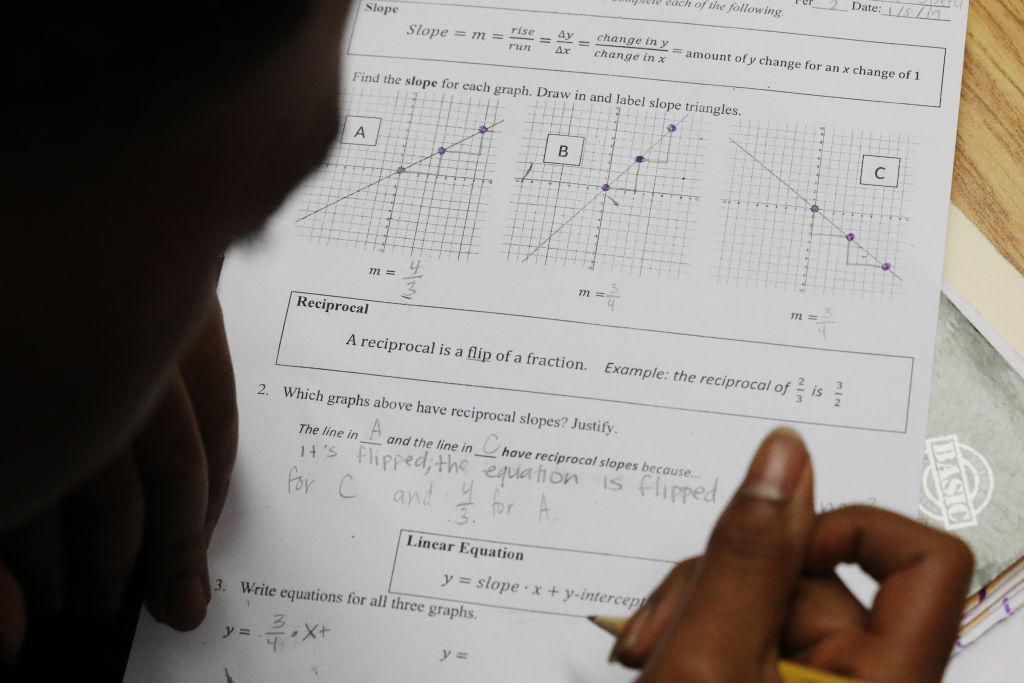School districts across the U.S. are constantly asking how to close the gaps in academic achievement and opportunities among students.
More and more leaders believe the solution lies in “detracking,” the practice of integrating students of different academic abilities in the same classes in the name of “educational equity.” But such practices are meeting opposition.
How do schools ‘detrack’?
In 2014, San Francisco United School District (SFUSD) decided to no longer offer Algebra I courses in middle schools. Instead, all students would take Algebra I together in ninth grade, their first year of high school. In place of the class, the school district designed a course containing elements of algebra specifically for eighth graders—available to all students regardless of ability—intended to universally prepare students for algebra when they enter high school.
Cambridge Public Schools (CPS) in Boston followed suit in 2017, removing algebra classes from middle school course offerings, with the goal of reducing demographic disparities in academic performance and preparing more students to take algebra in high school.
“We have a huge focus on addressing both the academic achievement gaps and the opportunity gaps in our community,” Victoria Greer, Cambridge Public Schools superintendent, recently told The Boston Globe. “One thing the district is not interested in doing is perpetuating those gaps.”
District leaders say the move doesn’t prevent students from learning algebra in middle school. Similar to SFUSD, of the seven total units taught in Algebra I, three are included in the CPS eighth-grade math curriculum. While students are still required to take Algebra I in ninth grade, the district does offer a free online summer Algebra I course as an alternative.
Detracking seems to be a trend elsewhere.
An earlier version of the recently approved California State Education Department’s Mathematics Framework recommended that all students take Algebra I in ninth grade. The framework received harsh backlash, including from parents, academics, and policy experts—and a petition with nearly 6,000 signatories—and was later revised to acknowledge that some students may be able to take Algebra I in middle school.
In 2021, the Virginia Mathematics Pathways Initiative (VMPI) included on its website proposed changes to end tracking in math courses through 10th grade before abruptly reversing course.
“Don’t put down other kids who are really hard-working,” one concerned parent from Fairfax County, Virginia, told The Washington Post at the time.
Belmont Public Schools, a Massachusetts district neighboring Cambridge, also reduced the number of advanced math options available for middle school students prior to the pandemic.
Portland Public Schools in Oregon had similarly planned to remove advanced math courses from middle schools, but recently backed away from that plan, saying it wanted to study the issue more.
And North Clackamas School District, outside Portland, Oregon, says on its math curriculum FAQ: “Any ability grouping in mathematics education is an inequitable structure that perpetuates privilege for a few and marginality for others.”
Why detrack?
Detracking proponents contend their hope is to give all students opportunities to succeed—particularly demographic groups underrepresented in higher-tracked courses—without holding other groups of students back.
“I am not opposed to student advancement as long as the system for allowing that advancement does not systematically push Black and brown students out of higher-level mathematics,” Jo Boaler, a professor of mathematics education at Stanford University and a leading proponent of detracking, wrote in a recent op-ed.
“Unfortunately, our current system operates in this way,” Boaler said.
She cited a significant gap among those who finish high school calculus. While 18 percent of white students completed high school calculus in 2019, the share for black and Hispanic students was only 6 and 9 percent, respectively, per data from the National Center for Education Statistics. Asian students completed calculus at a far higher rate than any other racial group, with 46 percent completing the course.
“The problem historically with tracking is that once you’re in a track, you stay in the track,” Robert Pondiscio, a senior fellow at the American Enterprise Institute and former fifth-grade teacher, tells The Dispatch.
“You had the phenomenon of black and brown students being put in lower tracks with no hope of ever escaping,” Pondiscio says, which “obviously is a problem and must be eliminated.”
But he proposes a different solution: “Put your best teachers working with the lowest ability groups.” Many advocates refer to that term as “ability grouping.” Such a practice allows for flexibility, as opposed to rigid divides between high and low achievers.
“In other words, just because you’re in the low-ability group this year, this unit, doesn’t mean that you don’t have the opportunity to kind of escape that in the future,” Pondiscio says.
Detracking pitfalls.
When schools detrack their curricula, that can intensify “disparate level of skills in the same classroom,” Pondiscio says. “What you end up doing as a practical matter is pitching your instruction either at the middle, or frankly, below the middle, to bring as many students along as you can.”
As a result, some parents say their children’s education is less rigorous than it should be and for supplemental education. “I have to get tutoring, like all the private school students, to help him,” one CPS parent recently told The Boston Globe.
Naturally, not all families can afford a supplementary education for their children, which can lead to an income disparity in public school education itself.
“The students who are able to jump into a higher level math class are students from better-resourced backgrounds,” said another CPS parent.
“The idea that you can somehow pull these levers and get everybody to the same level is the type of thing that sounds good in theory, but seldom works out in practice,” says Pondiscio.









Please note that we at The Dispatch hold ourselves, our work, and our commenters to a higher standard than other places on the internet. We welcome comments that foster genuine debate or discussion—including comments critical of us or our work—but responses that include ad hominem attacks on fellow Dispatch members or are intended to stoke fear and anger may be moderated.